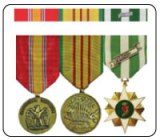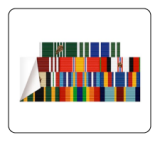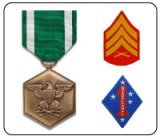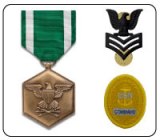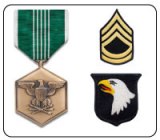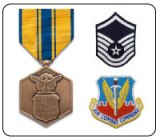Gold and Silver Lifesaving Medals. The Gold and Silver Lifesaving Medals
were
originally created by Congress in 1874 and are now authorized by 14
USC 500, dated
August 4, 1949. These U.S. decorations are not classified as military decorations but
are authorized for wear by Coast Guard personnel.
1. Eligibility. The Commandant awards the Gold and Silver Lifesaving Medals
under the general criteria listed below:
a. The Gold Lifesaving Medal or the Silver Lifesaving Medal may be awarded
to any person who rescues or endeavors to rescue any other person from
drowning, shipwreck, or other perils of the water. The rescue or attempted
rescue must either take place in waters within the U.S. or subject to the
jurisdiction thereof, or one or the other of the parties must be a citizen of the
U.S. or from a vessel or aircraft owned or operated by citizens of the U.S.
(1) The Gold Lifesaving Medal may be awarded to an individual who
performed a rescue or attempted rescue at the risk of his or her own life,
and demonstrates extreme and heroic daring.
(2) The Silver Lifesaving Medal may be awarded to an individual who
performed a rescue or attempted rescue where the circumstances do not
sufficiently distinguish the individual to deserve the medal of gold, but
demonstrate such extraordinary effort as to merit recognition.
(3) Military personnel serving on active duty would normally not be
recommended for Gold and Silver Lifesaving Medals; however, military
personnel may be recommended for a Lifesaving Medal if the act of
heroism
was performed while the individual was in a leave or liberty
status. In all
other circumstances, a military award should be considered.
For military personnel, a determination of extraordinary heroism will be
made in
accordance with Chapter 1.B.5.
2. Recommendations. Recommendations for the awarding of Lifesaving
Medals,
or requests for information pertaining to these awards, should be addressed to the
Commander of the Coast Guard District where the incident
took place. Table 4.1
identifies the districts’ geographical boundaries. If the
district is unknown, or if
the incident took place outside any such district, recommendations should be
addressed to Commandant (CG-1221), U.S.
Coast Guard, 1900 Half Street, SW,
Washington, DC 20593-0001, who will forward the case to the appropriate
district for verification. There is no time limitation on recommending or
awarding of Lifesaving Medals.
Recommendations for the award of a Lifesaving
Medal may be submitted
by or on behalf of the person making or attempting a
rescue. The submission package must include the following: a. Satisfactory evidence of the lifesaving services performed, in the form of
affidavits made by eyewitnesses of good
repute and standing, testifying of
their own knowledge. The opinion of
witnesses that the person for whom an
award is sought imperiled his or her
own life or made extraordinary efforts is
not sufficient. The affidavits must
set forth, in detail, all facts and
occurrences, clearly showing in what manner
and to what extent life was
risked or extraordinary efforts were made so the Commandant may judge the
degree of merit involved. The affidavits shall
be made before an officer duly
authorized to administer oaths. A
commissioned officer of the Coast Guard
may certify an individual’s
credibility. Credibility certification is not
required if the affiant is an officer
or employee of the Federal Government or
a member of the Armed Forces
of the United States.
b. A statement identifying:
(1) The precise location of the rescue or attempted rescue, whether from
waters within the U.S. or subject to the jurisdiction thereof, or if the rescue
or attempted rescue was outside such waters, whether one or the other of
the parties involved was a citizen of the U.S., or was from a vessel or
aircraft
owned or operated by citizens of the U.S.
(2) The date and time of day,
(3) The nature of the weather and condition of the water, including air and
water temperatures,
(4) The names of all persons present, when feasible,
(5) The names of all persons rendering assistance, and
(6) All pertinent circumstances and data showing the precise nature and
degree
of risk involved.
c. Upon receipt, the Commandant or respective district commander shall refer
the recommendation to a designated Investigating Officer (IO) for
verification.
The IO will conduct an inquiry and develop additional
information and/or evidence necessary for the district commander to either:
(1) Terminate the verification process if there is insufficient justification to
continue further. If terminated, provide feedback to originator, with copy
to Commandant (CG-1221); or
(2) Complete the proposed recommendation and forward to the Commandant
for final determination using Lifesaving Award Form, CG-5685. Include
all relevant supporting material, a completed Coast Guard Award
Recommendation, form CG-1650, and include a proposed citation.
Authorized Devices: Gold Star |


